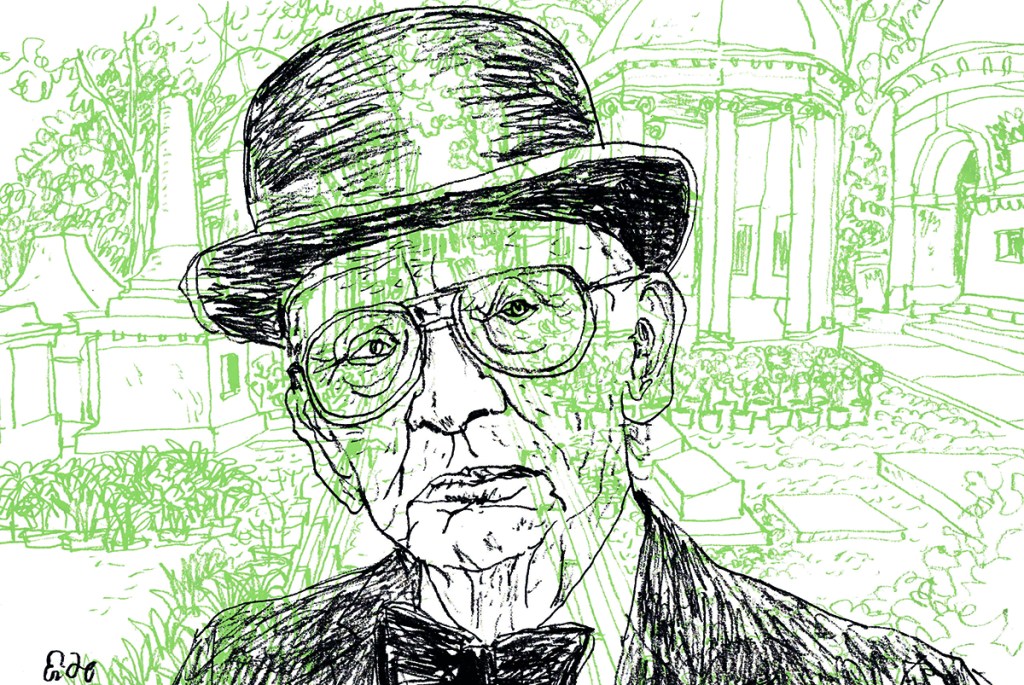The false sense of complacency in Washington DC, now restored as the imperial capital of the world, is only matched by a tone of utter bafflement. History has apparently renewed its march toward a progressive utopia, and the American cabinet seems as epidermally diverse as it is ideologically totalitarian. But there remains a sense of unease. The imperium suffered a systemic shock in 2016, one that needed and still lacks explanation. The shock was not limited to America. The Guardian struggles to comprehend that British Indians tended to support Brexit, and that members of their community such as Rishi Sunak and Priti Patel have risen to influence in the Conservative party and high office in the government. The New York Times is so baffled at the swing of minorities to a socially conservative Republican party, despite corporate-funded ‘anti-racist’ discontent, that it blames their defection on the quasi-theological concept of ‘multiracial whiteness’.
They should read the grand old man of reaction, Nirad Chandra Chaudhuri. An upper-class, cosmopolitan Bengali, born into a feudal family under the British Raj, Chaudhuri might seem to be an unusual guide to the roots of our current discontents. Born in November 1897, when the British Empire was at its apogee, he studied at the University of Calcutta, worked as a minor clerk in the imperial civil service and as a secretary to a nationalist politician, and then joined All India Radio during World War Two. The war, the threat of a looming Japanese invasion, and increasing sectarian conflict in India as imperial order weakened all shaped his worldview. He moved to England to work as a writer in the 1950s. Eventually, after being permanently hounded out of then-socialist India for alleged pro-imperial nostalgia, he settled in Oxford in the 1970s.
Chaudhuri relished his intellectual superiority, including over India’s erstwhile masters. He was an autodidactic pedant with a lemony wit, a photographic memory and talent for Classics and languages. A talent in a three-piece suit with an honorary doctorate from Oxford and honored as a Commander of the British Empire, he could memorize books and reprimand Oxford dons for forgetting the name of a particular military order. To his critics, this was performative; certainly, Chaudhuri carefully manufactured his persona because he knew his audience. But that criticism alone fails to explain his relentless, monomaniacal crusade to chronicle the decline of civilizations.
Predictably, Chaudhuri is now out of literary fashion. His two most famous books, The Autobiography of an Unknown Indian (1951) and A Passage to England (1959), are old-school part-ethnographical, part-anthropological studies. The Continent of Circe (1965), a study of militarism among Hindus in India from prehistory to modern times that won the Duff Cooper Prize, is an elaborate but selective historiography. Following the publication of The Autobiography, Chaudhuri was ostracized in India as the last imperialist and a ‘brown sahib’. His reputation improved somewhat after the economic liberalization of India in the mid-Nineties, partially aided by the unfortunate fact that most Indians never read Chaudhuri in full, but were nonetheless happy to see an Indian getting recognition in Britain. Even Britain’s establishment liberals seemed unsure about him. When Chaudhuri died in 1999, the Guardian was torn between celebrating the last brown-sahib scholar and denouncing a pro-British reactionary. These were the early days of Tony Blair’s liberal imperialism, so the Guardian settled for a passive-aggressive obituary celebrating Chaudhuri’s ‘extraordinary compound of acute intelligence, learning, egocentricity, and dottiness’.
His mid-1970s books on Sir Robert Clive (the victor of the Battle of Plassey and initiator of East India Company rule in India) and the pioneer of comparative religion Max Müller are decidedly unscholarly. His true reactionary spirit blossomed, however, in Thy Hand, Great Anarch! (1987), a study of the final days of what he called the epitome of ‘high-civilization’, the British Empire. And that is worthy of reappraisal now, with old great powers and even older civilizations returning to form, and the ‘high-civilization’ of the Anglosphere seemingly paralyzed, determinedly unable to unify or maintain the superiority that it has enjoyed since the collapse of Napoleonic Europe.
To understand Chaudhuri’s worldview, we must understand a now-lost class of late-imperial public intellectuals from upper-class feudal backgrounds, the products of the liberal and scientific Zeitgeist of the age. This is not as alien as we might think; consider Edward Said. British-educated, skeptical of democratic instincts and worried about the fraying of social order, Chaudhuri was simultaneously a cosmopolitan globalist, an ‘Englishman in spirit’ and a misfit in every civilization. Despised as an Anglophile and hounded out of a job in Nehru’s postcolonial socialist India, he returned the mutual hatred for what he saw as an abyssal ignorance engulfing his birthplace. ‘The intelligentsia of my country’, he wrote, ‘have always had the faith… that they are indispensable as mercenaries to everybody who rules India.’
His sardonic aphorisms were not inherently provocative. They just seemed so, because they were rebelliously anachronistic in Europe after 1968: ‘I am a Bengali and an Englishman. I am a striking illustration of the survival of the unfittest.’ Even before the views of Edward Said became gospel, Chaudhuri wrote things that were out of fashion, taboo even, in a postcolonial world. He argued that rehabilitative justice was futile, and that egalitarianism in academia was anti-intellectual and ultimately damaging for civilization. Everyone instinctively knows this to be true, but most lack the courage to utter it aloud.
Often compared to V.S. Naipaul, Chaudhuri lacked Naipaul’s gifts of narrative weaving and pessimism. To be a real pessimist, you need to have the luxury of identifying with a socio-literary cause. Jimmy, Roche and Jane, the damaged characters in Naipaul’s Guerrillas (1975), are observable in every single Black Lives Matter protest. Naipaul always saw the inevitable (and often unfounded) darkness in the postcolonial hellscapes. Chaudhuri was less a novelist than a historian in the mold of Thucydides, withdrawn from moral judgments, a detached protagonist in his own tale: ‘When I write in English, I am not writing as an Indian or an Englishman. I am just a writer. Writers know no nationality.’ His loyalty was to a higher order.
Chaudhuri considered himself to be a classical Whig, but his instincts were reactionary. In Naipaul’s A Bend in the River (1979), every toppled statue predicts a coming collapse of civilization. Chaudhuri also would be mortified by ‘Rhodes Must Fall’ or Decolonize Literature protests. Naipaul would blame the social disorder on the rebellion of the voiceless and anarchic who dwell on the margins of civility, the ‘subalterns’, as the Indian literary theorist Gayatri Spivak calls them. Chaudhuri would blame the elites for tolerating them. He would lay the blame at the feet of our feminized and often somewhat myopic leaders — unable or unwilling to govern and put an end to anarchy — more than on the anarchists themselves.
‘In Calcutta to my great disgust I saw bands of ragged street urchins throwing mud and dust at the (European) tram cars,’ Chaudhuri wrote in the dying days of the Raj. He was delighted when he visited England for the first time. ‘Never before, except in the intimacy of my family life, had I been so happy as I was during my short stay.’
Chaudhuri’s stint at All India Radio during World War Two was formative for his Burkean aversion to disorder and his melancholic skepticism of mass democracy. Like all true reactionaries, he understood that the thin line that separates civilization from chaos and barbarism is not racial in nature, or even related to class, virtue or morality: it is a matter of imperial order. Having observed the Great Calcutta Killings of 1946, where the absence of British troops led to a riot that saw hundreds of thousands of Hindus butchered, he reluctantly concluded that every thriving high civilization had been imperial in structure and that anarchy is simply an absence of hierarchy. Though Chaudhuri never read Samuel Huntington’s Clash of Civilizations or Kenneth Waltz’s Man, the State and War, he shared this perception with contemporary foreign-policy realists.
Nirad Babu, as he was known, took as his personal heroes Lord Curzon and Sir Henry Maine, conservative ‘civilization builders’ who never cared about anything other than the judgment of capital-h History. But his personal villains were also imperial: the liberal Victorian ruling class that encouraged the ‘prejudiced brooding malevolence and herd-like collectivist tendencies’ of the Indian masses while resenting the fact that another result of liberal imperialism, a supply of upper-caste, educated and cultured Indians, could out-compete them in both intellect and class. There is an amusing parallel here from the American empire: white middle-class liberals in New York or California support ‘racial justice’ but are paranoid about admitting too many meritorious and hardworking Asians to college campuses.
Chaudhuri’s true gift was, however, not for provocation, but observation. His pain at the withering away of the Raj was one of disillusioned betrayal:
After the heroic efforts of six years (1939-1945) the will of the British people suddenly failed… all the advantages which the British had in India by virtue of their Empire were bequeathed on its winding up to those who were opposed to it, and not to those who supported it.
This remains a puzzle. Britain lacked the aggregate manpower to dominate the world — an uncomfortable statistical reality which is almost never discussed anymore. The British ruled an empire with the consent and aid of a significant majority of their subjects. Why then did it not listen to the pro-imperial half of its subjects in India? This question has contemporary American relevance. What happens to conservative Hispanics and Asians in deep-blue states? Why is there no outreach to the African Americans whose neighborhoods have suffered due to riots orchestrated by the distinctly middle-class and predominantly white antifa?
The provocative opening lines of Autobiography are dedicated to the memory of the British Empire, which ‘conferred subjecthood but withheld citizenship’, to which he threw the challenge Civis Britannicus sum, ‘I am a British citizen’: a call for full enfranchisement. And yet the challenge was thrown because all that was worthy of nobility within the challengers had, Chaudhuri believed, been ‘made, shaped and quickened’ by the same British rule.
In postimperial Britain, Chaudhuri saw a civilization lacking confidence, starting to show the first signs of internal rot: ‘The worship of Gandhi is unqualified imbecility and a sure proof of the degeneration of the British character.’
To him, the patterns of decline in any high civilization were similar. Bengal, his birthplace, was the cultural driver of British India: the political and the intellectual capital, the first trade port, the site of the premier universities, museums and colleges. Modern India was shaped by the liberal and educated class of Indians, especially Bengalis, under the patronage of the British. One can still find archived letters from the Brahmo Samaj and Young Bengal, learned societies from the late 19th century comprising British-educated, upper-class and socially liberal visionaries, thanking the Viceroys for establishing science colleges, abolishing the practice of sati (widow-burning) and allowing widow remarriage. Like all liberals in history, however, they lost control to the radicals.
Calcutta commanded India’s political and cultural life because its elite was British-educated. It lost this dominant position in the early 1900s because educated, upper-class Bengalis were acceptable neither to the literate but unwise native radicals nor to the Kiplingesque British ruling class. During World War Two, Chaudhuri was revolted by Subhas Chandra Bose, the revolutionary nationalist who allied with Adolf Hitler, founded the Azad Hind Army with the help of Imperial Japan, and declared war on Britain. Chaudhuri considered Bose and his followers to be incompetent turncoats. But his deepest scorn were reserved not for the ‘uncultured plebs’, but for a ruling class which forgot how to rule and refused to risk anything: ‘An exercise of imperial authority was necessary for the protection and survival of civilization.’
Throughout his life and career, Chaudhuri despised one thing and one thing only, the elevation and subsequent worship of the subaltern. To his Brahminical sensibilities, nothing of intellectual or cultural value ever came from the margins or the depths. There is perhaps some truth in that; one look at Twitter or the comments section of any magazine should cure any normal person from the unfortunate affliction of any idealism about mass intellect. But Chaudhuri was perhaps the first man in postcolonial history to point out the socially destructive potential of the combination of the then-emergent mediocre and genetically bureaucratic elite, combined perniciously with the social worship of the emetic and the profane.
Mediocrity is always the hallmark of bureaucracy, which is risk-averse and self-sustaining by design. But the British imperial bureaucracy was kept in check by a ruling class. It had a certain sense of its place in history and a paternalist vision of the common good. These were destroyed by the world wars, the two systemic shocks from which Britain has never recovered. To Chaudhuri, mediocrity was so thoroughly institutionalized in postwar Britain that by the late Sixties, it had created its own ruling clique to support and promote further mediocrity:
Perhaps for the first time in the history of mankind, an ordinary majority has been put in a position of authority over an exceptional minority, with disastrous consequences for everything coming from the mind. This majority is conscious of its power and is therefore also aggressive.
Chaudhuri would have foreseen the ‘1619 Project’ winning a Pulitzer Prize and Nikole Hannah-Jones, the chief author of this fiction, claiming victimhood when her credentials for tenure at a university were questioned. To him, the greater danger was not a return to a Hobbesian state of nature, but rather a rump civilization stumbling through a long decline and led by unimaginative intellectual peasants. ‘History,’ Chaudhuri wrote, ‘had shown empires as protectors and reclaimers of civilization, and empires had taken over the keepership of civilizations when its creators had become incapable of maintaining them.’
The modern liberal ruling class’s instincts are egalitarian and liberal, not imperial. It is thus unsuited for governance. It lets the market decide the political order and is therefore destined to fail. Lacking a balancing central authority, society fractures more, until finally it destroys its fabric and then its foundations. Like James Burnham, Chaudhuri spotted the emergence of this new elite, the kind of unoriginal, moronic but heavily credentialed upper middle class that we have now:
They know as well as anybody else, particularly their victims, that they have no power to make either themselves or others happy. Theirs is a world without enjoyment. I am choked by their fiction, which at best is incompetent sociology, and by their sculpture and painting, which I cannot characterize.
The forces Chaudhuri saw a hundred years ago are the forces driving the current realignment in America. A self-referential, mediocre elite that is disdainful of patrimony, servile to the subaltern, and oblivious of its responsibility to restore beauty and order toward a common good rules us. A massive, multiethnic populace, its inner reactionary core enraged, stares down an ugly and radical governing edifice. ‘I am repelled by (the elite) anger which is querulousness, and above all by their compassion which is self-pity,’ he wrote. ‘Ordinary people, who have a sure instinct for happiness, shun their work like poison.’ Nirad Chandra Chaudhuri saw it all coming.
This article was originally published in The Spectator’s August 2021 World edition.


















